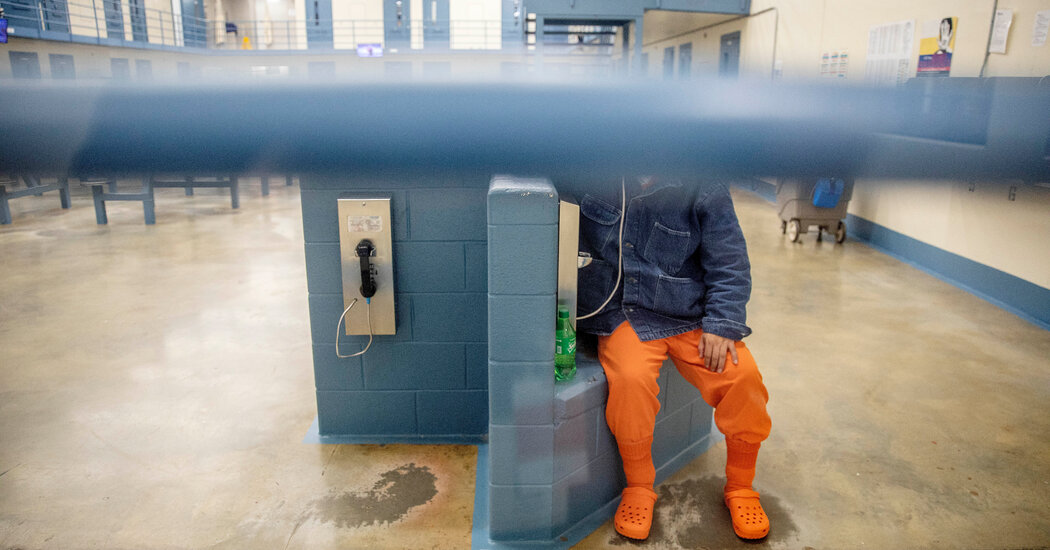Lawyers for the federal government said immigrants detained for months while they fight deportation are not entitled to seek release from immigration judges.
WASHINGTON — The Supreme Court heard arguments on Tuesday over whether immigrants detained for long periods while they are fighting deportation are entitled to hearings to decide whether they may be released on bond as their cases move forward.
The court’s answer to the question, which it considered in two cases, will affect thousands of immigrants detained for many months while their cases are decided by immigration courts facing long backlogs.
Justice Stephen G. Breyer said allowing people to seek release as their cases work their way through the legal system is a bedrock principle with deep historical roots. “Given the history of this nation and Britain, where you’re going to detain a person, not even a criminal, you know, for months and months and months, why aren’t they at least entitled to a bail hearing?” he asked. “That’s all that’s at issue.”
Curtis E. Gannon, a lawyer for the federal government, responded that “Congress can make rules for noncitizens that it can’t for citizens and that detention during removal proceedings is constitutionally permissible.”
The first case concerned Antonio Arteaga-Martinez, a citizen of Mexico who entered the United States unlawfully, fleeing what he said was gang violence against him and his family. After he was arrested in 2018, an asylum officer made a preliminary finding that he had a reasonable fear of persecution if he was returned to Mexico.
Mr. Arteaga-Martinez was detained while he waited for an immigration judge to consider his request to halt his deportation on that basis. After four months without a hearing, he challenged his detention in federal court, saying that an immigration judge should decide whether he should be released while his case moved forward because he was neither a flight risk nor a danger to the community.
Lower courts ruled in his favor, and an immigration judge ordered his release. The federal government sought Supreme Court review, saying that the governing statute did not require bond hearings before immigration judges and could instead be satisfied by informal reviews conducted by Immigration and Customs Enforcement officials.
The statute was the subject of a 2001 decision, Zadvydas v. Davis, which held that the government may not detain immigrants indefinitely if no country is willing to take them. If deportation was not likely in the “reasonably foreseeable future,” Justice Breyer wrote for the majority in the 5-to-4 decision, immigrants must be released unless there was a good reason to detain them.
Justice Clarence Thomas, who dissented in the Zadvydas decision, suggested that the ruling was all that stood between Mr. Arteaga-Martinez and certain defeat.
“Would you prevail had Zadvydas not been decided?” Justice Thomas asked Pratik A. Shah, a lawyer for Mr. Arteaga-Martinez.
Mr. Shah responded that “if this court were to overrule Zadvydas, we lose.” But he added that the government had not asked the court to do that.
Justice Elena Kagan said there was another way to look at the question. “Suppose,” she said, “that this court thinks about Zadvydas as, you know, a precedent that needs to be applied but not one that is altogether comfortable and should not be extended.”
Mr. Shah rejected the premise of the question. “I am not asking this court to extend Zadvydas one millimeter,” he said.
Justice Amy Coney Barrett asked whether the principle in that decision was limited to immigrants with nowhere to go or also applied to proceedings that “continue to drag on and on and on.”
Austin Raynor, a lawyer for the federal government, took the narrower view.
Justice Kagan said she would not draw a distinction between the two circumstances. “I’m not sure,” she said, “it quite matters to the person who’s in detention whether you’re in detention because they can’t find a country or whether they’re in detention because the immigration system is backed up.”
Mr. Raynor, who said the next hearing on Mr. Arteaga-Martinez’s effort to avoid deportation was scheduled for 2023, said some kinds of court challenges to immigrants’ detentions might still be possible if the court were to rule against bail hearings.
Justice Sonia Sotomayor questioned whether individual lawsuits in federal court were a realistic alternative.
“You keep talking about an individual challenge is adequate to protect the rights of these individuals,” she told Mr. Raynor. “Most of these noncitizens are overwhelmingly nonlawyers, and for virtually all of them, English is not a first language. Most of them are impoverished.”
A second case argued Tuesday presented the same question as the first one, with an additional wrinkle: It involved class-action lawsuits in which federal courts had ordered bond hearings for hundreds of immigrants. Several justices expressed skepticism that those rulings were authorized by the immigration laws.
Only seven justices took the bench on Tuesday for arguments in the two cases, Johnson v. Arteaga-Martinez, No. 19-896, and Garland v. Gonzalez, No. 20-322.
Justice Breyer, who is 83, and Justice Sotomayor, who has diabetes, participated remotely. A court spokeswoman said Justice Breyer’s absence followed what was later determined to be a false positive result for the coronavirus from a rapid test administered Tuesday morning.
Six of the remaining justices wore masks for all or most of the arguments. The exception was Justice Neil M. Gorsuch.


























